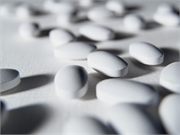Popular Heartburn Drugs May Up Odds of Stomach Bug
By Serena GordonHealthDay Reporter

WEDNESDAY, Nov. 27, 2019 (HealthDay News) -- If you're one of the millions who rely on medications known as proton pump inhibitors for relief from heartburn, you may be at higher risk of illness from a stomach bug, new research suggests.
Proton pump inhibitors (PPIs) include medications such as Nexium, Prevacid, Protonix and Prilosec.
The study from France found that people who took these acid-relieving medications were about 80% more likely to get a bout of stomach flu. The findings were published Nov. 27 in JAMA Network Open.
PPIs are sold over-the-counter in the United States and are supposed to be used for the short-term relief of heartburn symptoms. For a long time, these meds were considered to be very safe, but more recent research suggests they have some concerning side effects.
"Very few people need to be on PPIs long term, but people do end up on them chronically. And now we're finding that the drugs are not as safe as we thought. They interact with a bunch of drugs. There are some nutritional concerns. There's an increased risk of fracture and an increased risk of infection," explained Mina Tadrous, who wrote an editorial accompanying the study. He's a scientist with Women's College Hospital in Toronto.
Tadrous said people need to have a discussion with their doctor if they're taking these medications. For people with certain conditions, the benefits of the drugs may still outweigh the risk.
Stomach flu -- what doctors call acute gastroenteritis -- is usually a short-lived illness caused by a virus. Symptoms include vomiting and diarrhea, according to the U.S. National Institutes of Health.
The study's researchers, led by Ana-Maria Vilcu of Sorbonne University in Paris, compared information from a French national database. They looked at more than 233,000 people taking PPIs continuously and compared them to nearly 627,000 French adults who were not taking those drugs.
When the investigators looked at the 2015-2016 winter virus season, they noted that people who took PPIs all the time were 80% more likely to get the stomach flu.
There are a number of plausible reasons how taking PPIs might increase the risk of infection, but the most likely is that they reduce acid, and that stomach acid probably plays a role in keeping the viruses at bay.
"If you reduce acids, you change the intestinal flora [the beneficial bacteria in the gut known as the microbiome], making you more susceptible to infections," Tadrous suggested.
Dr. Arun Swaminath is director of the inflammatory bowel diseases program at Lenox Hill Hospital in New York City, and reviewed the study. "PPI's are increasingly in the news for being found to have drug-related adverse events," Swaminath said. However, he noted there are a lot of potential issues with the design of these studies.
For example, in this study they diagnosed someone as having acute gastroenteritis if they received a prescription for medications used to treat acute gastroenteritis. But Swaminath pointed out those medications can be used to treat other issues as well.
Another concern he raised is that the study only considered people to be on PPIs continuously if they had a prescription for a PPI. "But PPIs are available over the counter in France. Assuming all patients who didn't have a prescription for these medications weren't exposed to PPI can make the magnitude of the association larger than it really it is," Swaminath said.
Tadrous said that people should be open to the idea of discontinuing PPI therapy if it's not clearly necessary.
Those who likely need long-term PPI therapy include people who need to take nonsteroidal anti-inflammatory drugs long-term to help prevent ulcers. Also, people with conditions such as severe esophagitis, Barrett esophagus, idiopathic chronic ulcer, difficult-to-control gastroesophageal reflux disease (GERD), Zollinger-Ellison syndrome, and some people with bleeding ulcers, according to the editorial.
For those who might not need PPIs, Tadrous said dietary changes can help. That includes changing the types of foods you eat, when you eat and how much you eat, he said.
More information
Learn more about treatment with heartburn medications from ChoosingWiselyCanada.org.

The news stories provided in Health News and our Health-E News Newsletter are a service of the nationally syndicated HealthDay® news and information company. Stories refer to national trends and breaking health news, and are not necessarily indicative of or always supported by our facility and providers. This information is provided for informational and educational purposes only, and is not intended to be a substitute for medical advice, diagnosis, or treatment.

